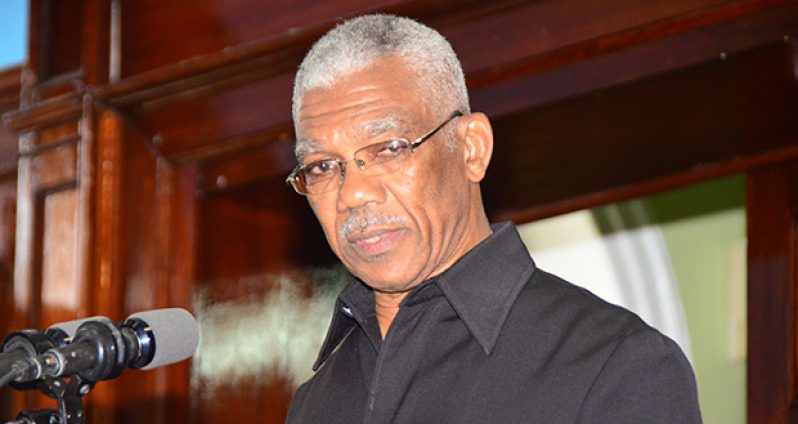By Ravin Singh
THE lives of the newly elected town councils will begin shortly, and President David Granger has touted a corporate approach which will see these local government bodies generating their own revenues rather thandepending on Government subventions. This strongly held view was expressed last Friday during the President’s weekly television show “The Public Interest”, which was subsequently broadcast on the National Communications Network (NCN).
On Friday last, the long overdue Local Government Elections (LGE), last held in 1994, were held in Guyana. Of a population of approximately 799,000 (2013 statistics), a total of 507,633 persons had qualified as electors and had been registered on the Official Voters’ List.
However, Chief Elections Officer (CEO) Keith Lowenfield on Saturday announced that only 38-39 per cent of the electorate voted at these elections. The democratic expression of casting a ballot was facilitated at 1,562 polling stations in 71 Local Authority Areas.
The Guyana Elections Commission (GECOM) had announced that the total number of groups, political parties and individual candidates contesting these elections were 83. These included three political parties, 17 voluntary groups and 63 individual candidates.
Registering landslide victories in traditional strongholds was the APNU+AFC coalition which secured 25 of the 30 seats in the municipality of Georgetown, 15 of the 16 seats in the mining town of Linden, and 12 of the 14 seats in the municipality of New Amsterdam.
The People’s Progressive Party (PPP) obtained 14 of the 16 seats in the Municipality of Anna Regina and nine of the 14 seats in the municipality of Rose Hall Town.
And according to President Granger on his weekly television show, these elections were important since they reflected the restoration of democracy at the municipal level.
“I feel a deep sense of satisfaction that in less than a year the coalition has been able to make these elections possible,” the Head of State told reporters.
DISSOLUTION OF IMCs
The holding of these elections also paved the way for the dissolution of Interim Management Committees (IMCs) which were established under the previous administration, and were deemed to be highly political in nature.
And while the composition of the newly elected councils was arrived at through a democratic process, the Head of State was keen to note that he is willing to work with whoever is elected to ensure that energies are combined to give all Guyanese a good quality of life.
LIKE CORPORATIONS
The President also expressed his vision for the councils, which he hopes will practise the highest level of professionalism when executing their duties.
Firstly, he envisions the councils themselves becoming corporation-like in nature, capable of raising their own revenue in their communities, rather than depending on Government subventions.
And although this might not seem as simple as it sounds, he believes that if they are able to explore non-traditional routes, such as manufacturing, it can be achieved.
“I think the municipalities should see themselves as corporations, encouraging business rather than just being administrators expecting subventions. They must examine ways of generating revenue and earning a profit,” he explained.
According to him, Guyana has tremendous agricultural potential which he believes is under-exploited. He opined that most of the country’s agricultural produce could be bottled, packaged, or processed for use locally and for export. According to the World Bank, in 2014, agriculture accounted for 18.28 per cent of Guyana’s GDP.
And with traditional foods such as pepper sauce, pineapple chunks and guava cheese already being produced locally, expansion on an industrial scale at the municipal level is one of the ways in which the local authority bodies could fashion themselves as corporations, he added.
JOB CREATION
Moreover, with a soaring unemployment rate, which currently stands at approximately 40 per cent, the President expects these new councils to pay attention to the economy in terms of alleviating unemployment through job creation.
Having toured the length and breadth of Guyana, President Granger, who is also a historian, is of the view that every town in Guyana has economic potential to open factories, encourage investment, and provide employment for people living in those areas.
And also supporting efforts to reduce this unemployment rate is the need for completion of the formal education system, the Head of State said, adding that this is one of the responsibilities of the councils.
“I would like to see the councils accept responsibility for ensuring that every single child in that municipality or neighbourhood gets into school and stays there,” President Granger stated.
Last year, upon ascension to executive office, the Government embarked on a national, environmentally- friendly journey in dealing with the country. And maintaining these efforts is what the President hopes the municipalities will do as they seek to further develop their communities.
“I would also like to see there is more attention to “greening” Guyana; that is, the environment. Last October we introduced this practice of a National Tree Day, and I’d like to see a ‘greener’ Guyana in all of the municipalities; more fruit trees, more attention to the canals and solid waste management and so on,” President Granger said optimistically.
Finally, one of the primary expectations of the councils is effective communication with their constituencies. Realistic in his reasoning, the Head of State suggested that once people remain in positions for too long, they tend to lose contact. And this, according to him, underscores the need for effective communication between councillors and residents in their respective constituencies.





.jpg)








